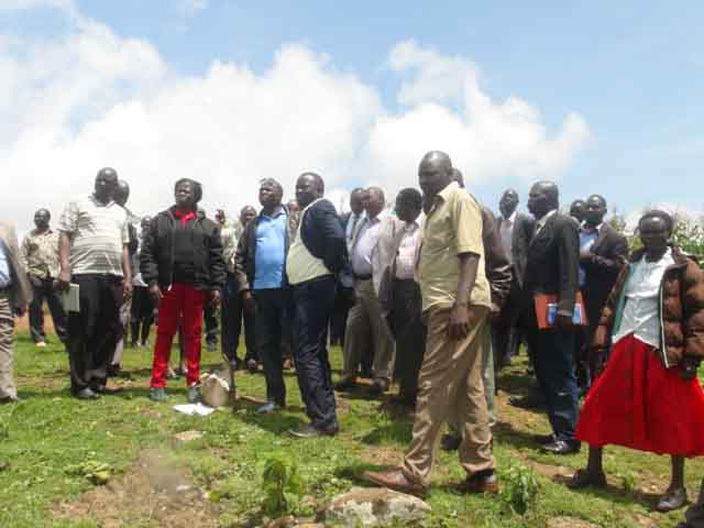Germany earmarks sh6b to mitigate climate change in Elgon region
The funds are being used to implement the Ecosystem Based Adoption (EBA) project, a system that engages the community to manage climate change to avert disasters.
Uganda is to benefit from a $ 1.9m (sh6.3b) grant from the German government to help in the conservation of the environment in Kapchorwa and Kween districts in the Elgon region in eastern Uganda.
The funds are being used to implement the Ecosystem Based Adoption (EBA) project, a system that engages the community to manage climate change to avert disasters.
Under the EBA project that started in 2011, communities plant trees and elephant grass in a space of 20 metres at river banks to prevent soil from getting eroded into the river thus preserving the quantity and quality of clean water.
Kapchorwa and Kween are among the districts in the Elgon region that have been greatly affected by the disastrous effects of climate change, which include severe drought, heavy rains, floods, landslides, pests and diseases that have impacted on communities.
There's a need to avert these disasters given that agriculture is the mainstay of the two districts. The main enterprises include livestock rearing and the cultivation of food crops that include millet, potatoes, beans, simsim and sunflower. There are also cash crops like cotton, coffee and wheat in addition to fruits and vegetables.
MPs visit
Last week, 30 legislators on the Parliamentary Forum on Climate Change - Uganda (PFCC-U) visited Kapchorwa district to assess the impact of EBA thus far.
Led by Zombo district's Ora county MP, Lawrence Songa, who is also the forum chairperson; the lawmakers visited the Kaptokwoi and Sipi rivers in Kapchorwa district and Ngenge river in Kween district where riverbank management is being done.
They also inspected demonstration learning centres for soil and water conservation at; Sanza village in Kawowo sub-county, Chemare, Kasongo, and Kapsinda in Sanzara sub-county on the slopes of Kapchorwa.
The MPs also visited over 20 farmers in Kasongo village who adopted the use of affordable irrigation technologies using pipes connected to rivers up to their farms to sustain crop production throughout the year.
They also visited the proposed sh400m National High Altitude Athletics Training Centre located on Teriete hill Kapchesombe in Kapchorwa.
After the tours, Songa said, "We should admit the existence of climate change countrywide and we must find solutions to solve it. Community livelihoods must co-exist with the eco-systems surrounding it. EBA helps communities, crops, forests animals to benefit from one another."
The PFCC-U coordinator, Christine Kaaya, described EBA as "one approach to adaptation that recognises the rights of indigenous peoples, considers both cultural and biological diversity, and emphasises fair and equitable management of the ecosystem."
According to Kaaya, climate change happens when there are variations in weather elements for a specified period of time that affects rainfall, winds, temperatures, fog and water bodies, which disrupts the eco-system.
Kaaya told MPs that the Elgon region was suffering from serious degradation of soils and water arising from increasing human population, unsustainable land management practices like deforestation, poor soil conservation and permanent or perennial cultivation of the same plots of land.
 MPs on the Forum on Climate Change visiting the proposed sh400m national high altitude athletics centre at Kapshombe Kapchorwa district
MPs on the Forum on Climate Change visiting the proposed sh400m national high altitude athletics centre at Kapshombe Kapchorwa district
"Loss of tree cover, loss of soil fertility, soil erosion, poor health and sanitation have been identified as the most serious environmental factors affecting the Elgon districts. But farmers have been adjusting to these challenges mainly through; mulching and crop diversification" Kaaya said.
Bududa district woman MP, Justine Khainza, urged legislators to replicate the methods used in Kapchorwa in their respective constituencies to reduce the effects of climate change.
Tororo municipality MP Yeri Ofwono said the tour helped them get first-hand information about climate change and how it can be combated. He promised to push for funding and enactment of policies towards combating climate change in Parliament.
Bwamba county MP (Bundibugyo), Richard Gafabusa, who is also a former EBA project officer said: "The underlying principle of this project is that healthy ecosystems can play a vital role in maintaining and increasing resilience to climate change and in reducing climate-related risks and vulnerability."
Bwamba said over 200 Kapchorwa households have benefitted from the project under which a sh180m revolving fund from International Union for Conservation of Nature is being extended to community members in form of credit to improve their livelihoods.
In Africa, Uganda is the only country benefiting from the EBA project. It is also being implemented in Nepal and Peru, which have regions with characteristics similar to those of Kapchorwa and Kween districts.
The project that was funded through United Nations Environmental Programme, was implemented in partnership with IUCN.
What locals say
Patrict Soyekwo, the Chemare village loans committee chairperson said: "We sell the produce to Mbale, and neighboring Kenya. The proceeds have helped the members to pay school fees for their children, and sustain the families."
Chemutai Shakila of Bornet village said: "Under the IUCN credit project, I acquired 500 citrus fruit seedlings, which I planted on my one-acre piece of land and I now reap millions."
Sophie Yeko of Cheniare village said; "IUCN instructors trained me in soil conservation like mulching. I planted vegetables, citrus tree fruits and sun flower on one acre of land and I do not regret."